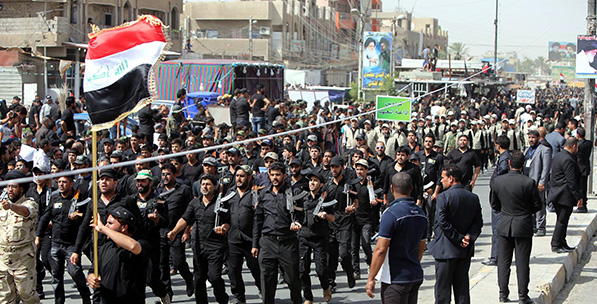"Wars lead to redistribution of the cards" is a well-known expression in international relations theory. In every possible scenario, whether one state is victorious over the other or even if they are unable to defeat each other, the map of power hierarchy is redrawn. In Indian-American international relations expert Parag Khanna's words, wars are the zeroing button of geopolitics. A similar approach can easily be applied to intra-state wars as in the case of the recent crisis in Iraq. Due to the kaleidoscope of problems that plays out in Iraq, we are also witness to a redistribution of the geopolitical deck of cards in the Middle East.
The 2003 U.S. invasion constitutes a turning point in the perception of Iraq's present-day dynamics. Having ruled the country for nearly a quarter century, Saddam Hussein had somehow managed to keep this inorganically formed state intact – both through oppression policies toward Kurds and Shiite communities. After the invasion, each sectarian and ethnic community started to put up a fight for their own community rather than for the sake and integrity of Iraq. Although Kurdish units successfully exercised this opportunity, Sunni groups had to carry the burden and legacy that Saddam Hussein had left to Sunni communities. The ruling of the country was left to Shiite and Kurdish groups, leaving Sunnis mostly neglected and excluded from the center. Therefore, what we witness today is a neutral flashback of social forces in Iraq: the Mosul-Kirkuk centered Kurdish region, Baghdad centered Sunni territory and finally the Shia majority in the Basra region.
They are also three different federal/autonomous Ottoman provinces from the 17th to 20th century. Iraq on the Edge of a Breakdown Since 2003, there has not been one single day without brutal, bloody assaults in Iraq. Even the ceaseless bombings that caused 50-60 deaths a day were not considered newsworthy. In such an atmosphere, desensitized Iraqis were on the edge of a breakdown. If these dynamics are not taken into consideration, the rise of the Islamic State of Iraq and al-Sham (ISIS) in Iraq cannot be understood. Indeed, it is not only the U.S. invasion and local dynamics that ushered in the present crisis in Iraq. The unending civil war in Syria along with the Russian, Chinese and Iranian support of the Assad regime also strengthened the Iraqi Shiite camp's confidence. It simply resulted in Iraqi Prime Minister Nouri al-Maliki's expansion of power across the country. This concentration of power also rendered the Iraqi Kurdistan Regional Government (KRG) as a relatively more visible and legitimate actor in reaction to the Iraqi government.
RISING KURDISH INFLUENCE
Century-old suppressed Kurdish populations straddling four nation-states – namely Turkey, Iraq, Syria and Iran – have enjoyed a sort of autonomy beginning in 1991. Their co-operation with the U.S. during the invasion of Iraq in 2003 increased this autonomy. Since then, the KRG initiated building the road to independence. Specific social situations in Iraq also facilitated this plan in Iraq. What keeps Turkish and Kurdish people together despite a bloody, 30-year conflict between the Turkish state and the PKK is the historically and socially intertwined nature of the two ethnic groups, which is not the case in Iraq. In order to maintain their ethnically distinguishable characteristics, Kurds in Iraq do not speak Arabic and do not want to visit Baghdad. Moreover, for more than a decade, the KRG has been gathering political, economic, and institutional experience in order to transform their lands from a 'quasi state' to an independent state. The only geographical obstacle or missing piece for the KRG was the oil-rich city of Kirkuk where a severe Arabization process was initiated under the Saddam regime.
However, Kurds never gave up their claims to Kirkuk – they asked for referendums, but the Iraqi central government always found a way to postpone this crucial step for cementing the future of Kurdistan. Recently, after IS







